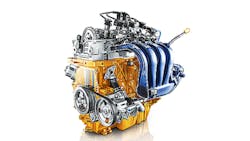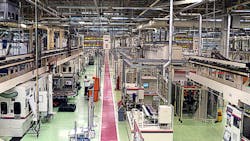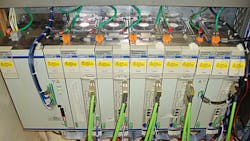For Fiat Powertrain, CNC Upgrade is Extending Machine Service Life
Fiat Powertrain is upgrading the CNC systems of 20 machine tools critical to its crankshaft and cylinder block production, in support of engine manufacturing at its Campo Largo, Brazil, plant. The goal is to extend the machines’ service life and minimize future maintenance downtime.
Each machine requires a custom upgrade kit comprised of a high-performance CNC unit, servo drives, and motors, specifically designed by NUM to speed installation and improved diagnostics and spare parts handling.
As part of Fiat Chrysler, Fiat Powertrain operates several manufacturing plants around the world, including four in South America. The Campo Largo plant, near Curitiba, Brazil, manufactures 1.6-liter and 1.8-liter E.torQ flex-fuel engines for medium-sized cars that can run on petrol or ethanol.
The E.torQ series was developed by Fiat Powertrain and started in production at Campo Largo in 2011. The engine block has cylinder head fittings separate from the cylinder jackets. The threads are positioned in the upper part of the water jackets, with the connections between the jackets and the outer dimension of the cylinder kept apart from the cylinder head fittings.
Set up by Chrysler and purchased by Fiat in 2008, the Campo Largo plant is described as one of the most modern in South America, and currently produces about 230,000 engines annually. It is outfitted with numerous multi-axis CNC transfer machines, machining centers and specialty machine tools, including a wide range of Cinetic-Landis crankshaft grinding machines, Heller machines for the external milling and grinding of crankshafts, and transfer machines produced by Comau, a Fiat subsidiary – for engine block machining.
In total, the plant’s crankshaft and cylinder block production involves 20 CNC machines with more than 120 feed axes. Each of these machines was originally fitted by a NUM 1050 series CNC unit, with NUM MDLU1 servo drives and NUM BMH series servomotors.
As the CNC systems aged, Fiat Powertrain became increasingly concerned with the likelihood of increased downtime. Troubleshooting and sourcing spare parts, as well as performing general machine maintenance, was threatening to take too long and impact production throughput. Since mechanically the machines were perfectly serviceable, in 2012 the company decided to extend the life cycle of the production lines by upgrading all 20 machines with modern CNC controllers, drives and motors.
CNC Review, Revamp
After reviewing various CNC manufacturers’ products and services, Fiat Powertrain concluded that NUM offered the best upgrade solution for Campo Largo’s specific needs: it is the CNC OEM for the current machines and was able to develop a faster-to-implement rehabilitation program, with the best benefit/cost ratio. According to Tarcisio Cruz Filho, technical support manager at Campo Largo:
“The fact that we are upgrading machines used for everyday production imposes some very demanding conditions. We needed a CNC supplier with the expertise and resources to collaborate on the design and installation of systems here in Brazil, while the systems themselves had to provide exactly the same level of functionality as our existing CNC equipment.
“We are impressed by the commitment to the project shown by NUM’s management team in Switzerland,” Cruz Filho continued, “and by the quality of technical support – including several on-site visits – provided by their U.S. office, especially given that the Brazilian market for this CNC series is not very large.”
One of Fiat Powertrain’s most critical requirements of the CNC replacement effort was that the new systems must be engineered so that the upgrade could be accomplished as quickly as possible, to minimize manufacturing disruption. Using video conferencing, technical teams from Fiat Powertrain and NUM quickly established that NUM’s Axium CNC platform provided the least invasive upgrade strategy, by using the same architecture as the earlier-generation 1050 series CNC, to minimize wiring and software modifications.
As part of the CNC upgrade process, the servo drives on each machine are being replaced by models from NUM’s latest NUMDrive C range: these are described as “some of the most efficient and highest power density drives on the market,” and this helps to simplify installation by overcoming the need for complex rack cooling arrangements.
The Need for Speed
In addition, the upgrade program also calls for replacing the motors on all machines’ feed axes to be replaced. Originally, these were fitted with NUM BMH series brushless servomotors, which are medium-inertia designs that have been popular with machine tool designers for diverse positioning applications.
However, these motors have been superseded by NUM’s BPH series motors, which offer better performance standards and environmental protection. The new BPH motors are physically identical to the earlier-generation designs in regard to shaft ends, pilot diameters and flange squares – again, simplifying replacement – and the orientation of their power and sensor connectors can be altered during installation to suit the machine configuration.
NUM also provided short adapter cables so that the existing motor wiring need not be changed, which saves a significant amount of time.
Tarcisio Cruz Filho pointed out that speed of upgrade is vital to Fiat Powertrain’s production schedules. “We allowed for a maximum of four days out-of-service time for each CNC machine on our crankshaft and cylinder block production lines,” he said. “Most of the machines on these lines have now been upgraded, and in each case – even on complex machines with seven controlled axes plus spindles – it has taken less time than we allocated, which says much for the CNC design and planning.
“The machines’ diagnostics are now much better,” he continued, “allowing us to perform more efficient preventative maintenance, and our technicians are now familiar with the CNC systems, all of which will help reduce production downtime in the future. We are on-schedule to complete the upgrades by the end of this year.”
Knowledge transfer proved to be valuable development of the partnership. According to Claudio Rocha, manufacturing engineering director for Fiat Powertrain’s Latin American operations, “The exchange of information and the training that NUM provided for our maintenance staff during the upgrade were important. We appreciate this open approach and the commitment demonstrated by the supplier in this program.”
About the Author
Robert Brooks
Content Director
Robert Brooks has been a business-to-business reporter, writer, editor, and columnist for more than 20 years, specializing in the primary metal and basic manufacturing industries.



